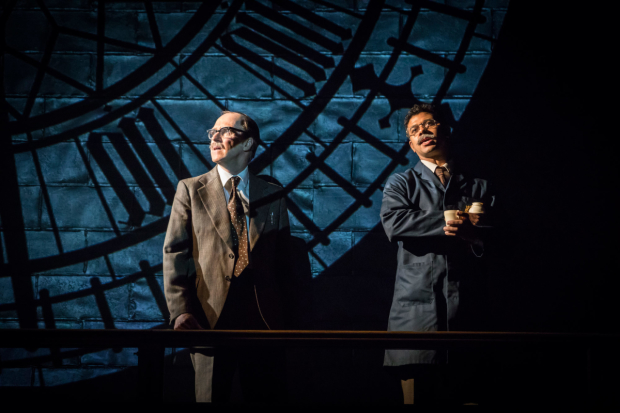Review: This House (Garrick Theatre)
James Graham’s play about the Labour party’s minority government in the ’70s returns to London

© JOHAN PERSSON
It’s taken four years for James Graham’s This House to travel from the National Theatre where it premiered in 2012, via Chichester, to the West End. But the passage of time has done nothing to diminish its exuberant impact – or its sobering pertinence.
It takes as its subject the most unlikely theme: the four and half years from 1974-1979 when Labour held power either as a minority government or with a fragile majority. It sets its action not in the streets of Britain, wracked with power failures, strikes and profound unrest, but in the House of Commons where the Labour whips office did everything they could to keep their side in power while their Tory opposite numbers pulled out every stop to thwart them.
It is the only play I can think of which builds a climax out of whether there will be enough votes on one side of Parliament to pass a rather boring bill about aircraft building. But Graham’s talent is to conjure high drama, raucous comedy and deep emotion from the most unlikely of places.
He’s beautifully served by a production from Jeremy Herrin that is realistic enough to make us believe we are watching the action in the shadow of Big Ben and so bold that it introduces David Bowie songs (played by a live band) and stylised dancing (choreography by Scott Ambler) and even makes the death of 18 MPs during those turbulent years upsetting yet theatrical.
The action (and Rae Smith‘s designs) work slightly less well trapped behind a proscenium arch than they did in the open spaces of the Dorfman and the Minerva, but the production still walks, with real brilliance, a perilous tightrope; it is constantly balancing the nitty gritty facts of the time with the relevance for our own. It works as a play because it both evokes memories of the past and yet also allows an audience perhaps not familiar with the intricacies of parliamentary history to enjoy the story (including – almost unbelievably – a faked suicide, an attempted murder charge, a left-wing revolt and three leadership elections) and draw their own conclusions.
Most importantly, in our times of Brexit and referenda, and in an era when Labour is once again doing what it does best "tearing themselves apart" it makes a simple case about the supremacy and importance of Parliament, and the years of tradition it represents. It is a love letter to custom and to decency, which is clear-eyed about the compromises of a parliamentary democracy, but which also asserts its fundamental values.
It’s true that you feel Graham’s heart is probably with the foul-mouthed oiks on the Labour side, committed to keeping Margaret Thatcher out of power; but the single most honourable act in the play is an offer made by the Tory deputy chief whip Jack Weatherill – played with some grace by Nathanial Parker. He’s matched in stature by Steffan Rhodri‘s Walter Harrison, ducking and diving to keep the fragile majority alive. Kevin Doyle, as chief whip Michael Cocks, Malcolm Sinclair as his opposite number, and Lauren O’Neil as rising star Ann Taylor are all pitch perfect. The surrounding cast, some playing many parts, have broadened their performances since the play’s premiere, but still provide a riot of colour, life and terrible flares.
Three hours and almost five years fly by in a moment. This House is a remarkable achievement for all concerned.
This House runs at the Garrick Theatre until 25 February 2017.












